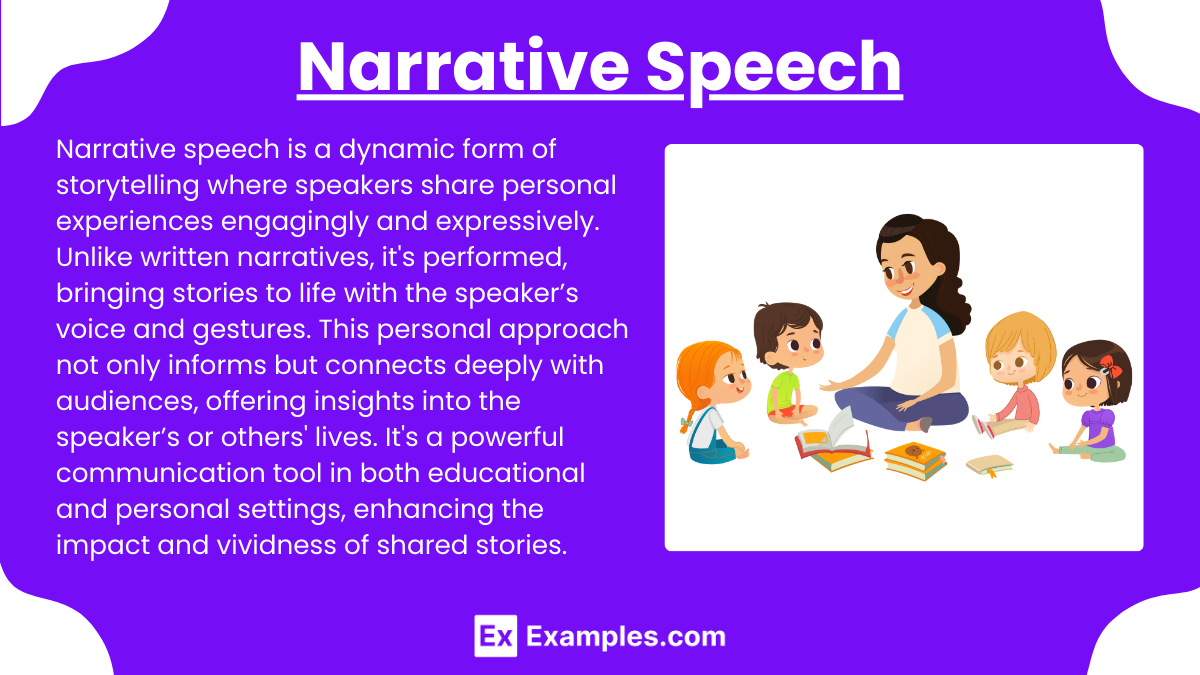10+ Narrative Speech Examples to Download
Narrative speech is a unique form of storytelling that allows speakers to share personal experiences and insights in an engaging and meaningful way. Unlike traditional narrative writing, which is often read, narrative speech is performed, bringing stories to life through the speaker’s voice and expressions. This type of speech is not only informative but also deeply personal, similar to a personal narrative essay. It provides the audience with a glimpse into the speaker’s life or the lives of others, making it a powerful tool for connection and understanding. Whether used in educational settings or personal gatherings, narrative speech enriches communication by making it more vivid and impactful.
What Is a Narrative Speech?
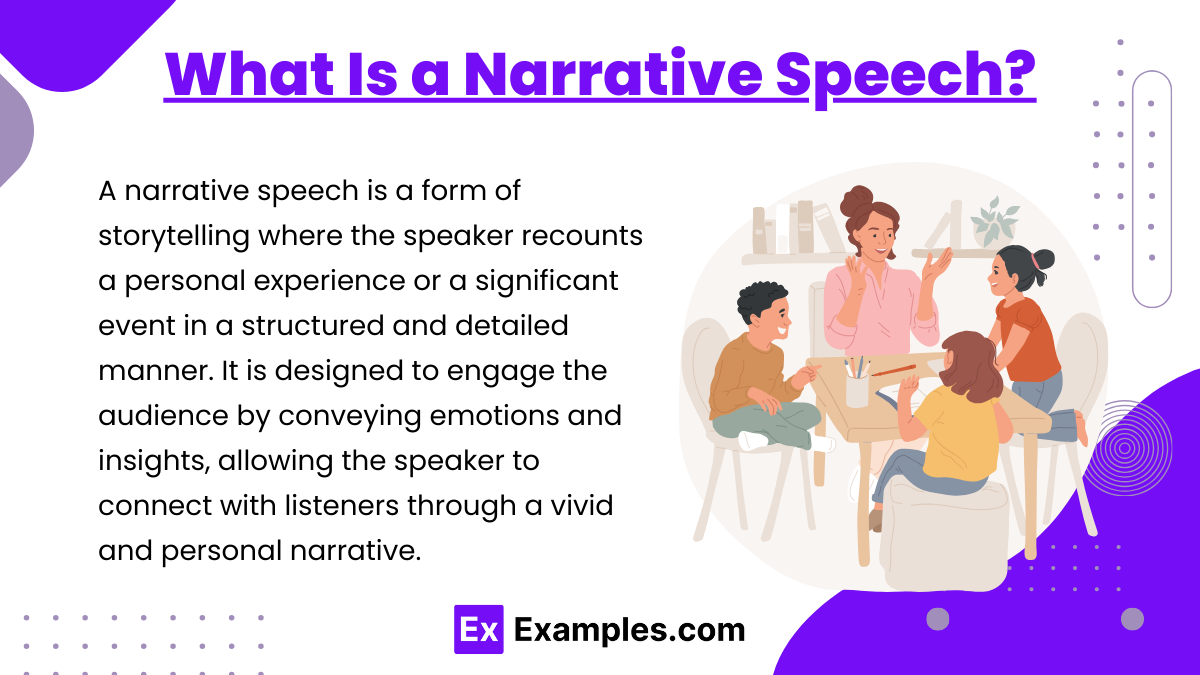
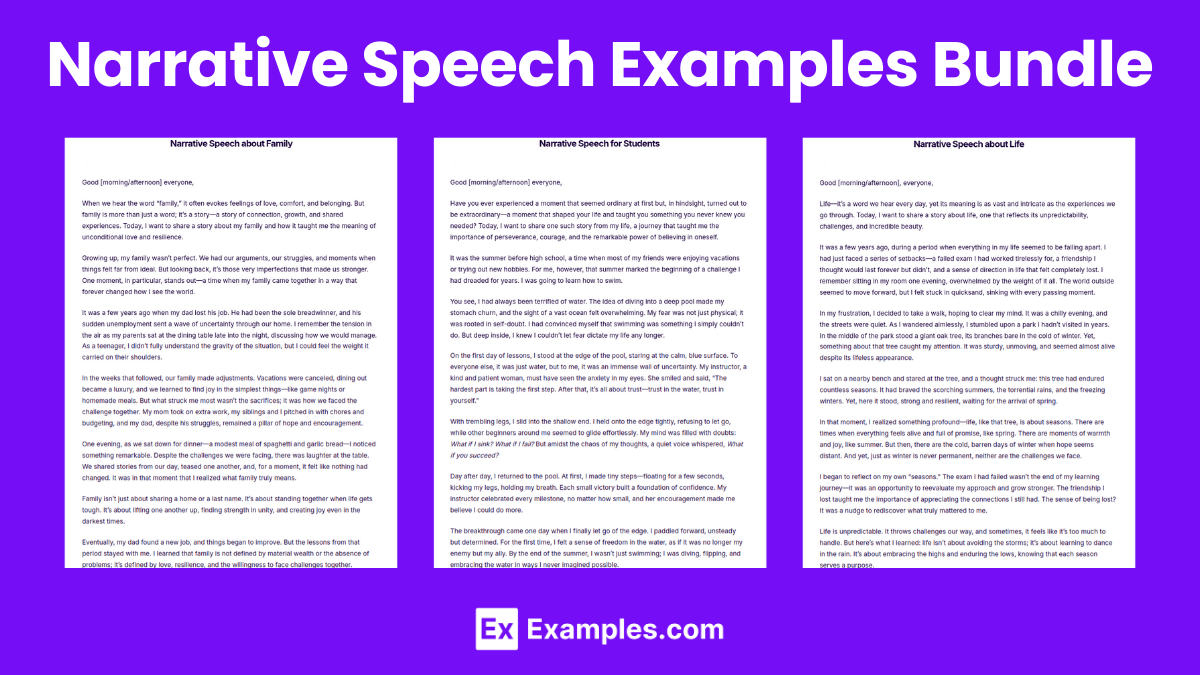
Narrative Speech Examples Bundle
Examples for Narrative Speech
Narrative Speech for Students
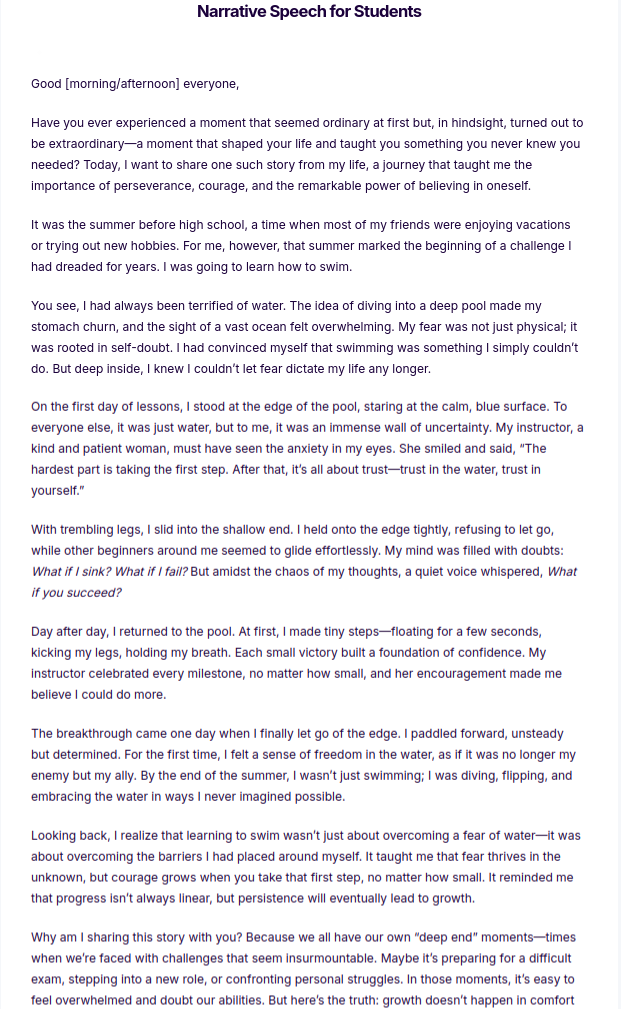
Narrative Speech about Life
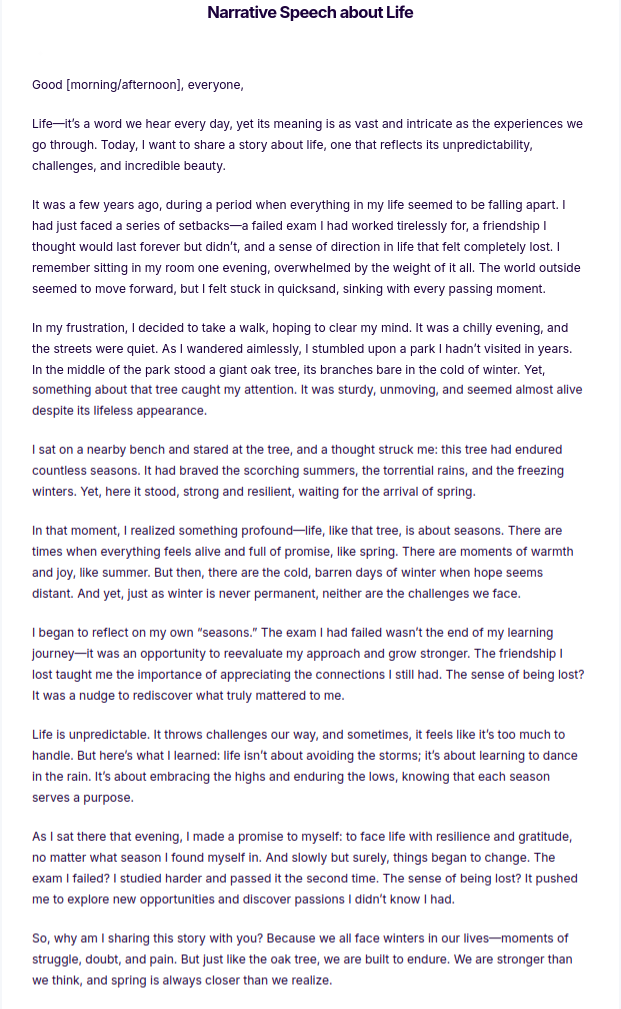
Narrative Speech about Family
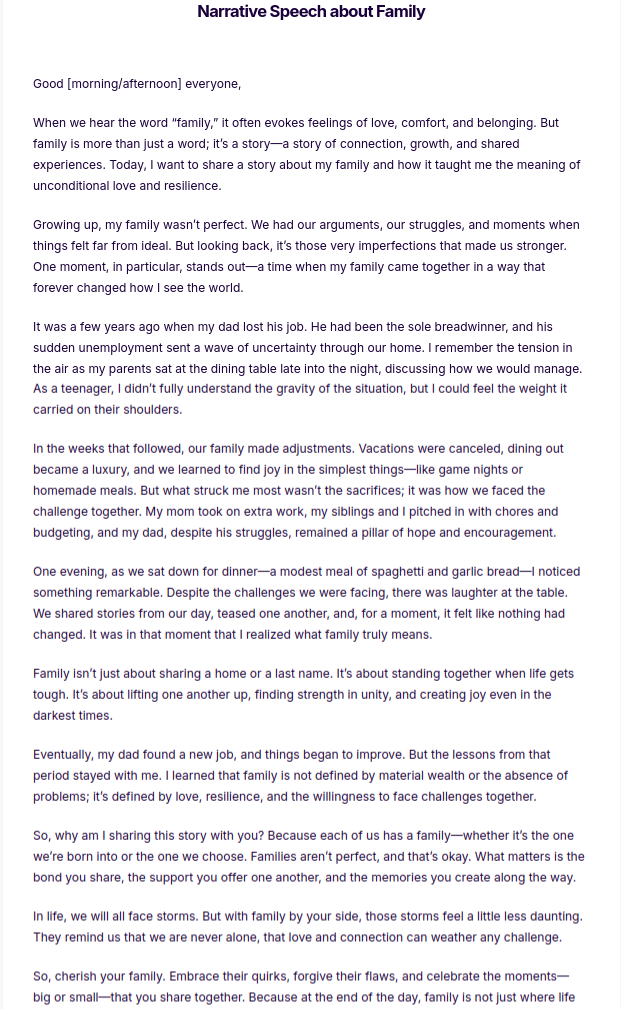
More Examples on Narrative Speech
- Narrative Speech about Love
- Narrative Speech about Covid-19
- Public Narrative Speech
- Short Narrative Speech
- Cultural Narrative Speech
- Personal Narrative Speech
Basic Personal Narrative Outline Example
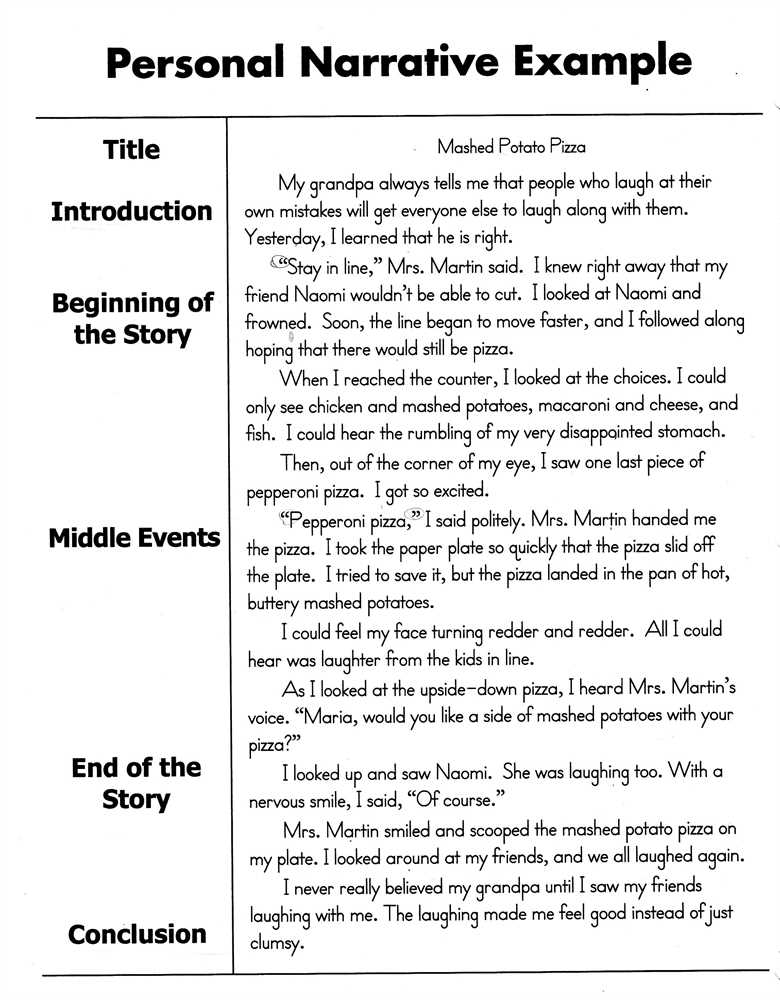
Part 1. Brainstorming Ideas for the Narrative
Every good piece of literature or movie must always have a great idea to begin the story. Once you have an idea on what you would want to share with the audience, it makes things easier for you to explain as you just have to boil down to the specifics on what experiences can best go with the theme you are going to share. Listed below are some of the ways to brainstorm ideas:
Think of a memorable event or a moment in your life. Sure there are many moments and memories in your life that you have felt and experienced over the years. But there are only so few that have struck you to the depths of your soul that you cannot help but not forget that instance, even when you become old and gray. It does not have to be something major, it can even be as something simple as your first date with her and how you felt whenever she was with you. You may also see declamation speech.
For example, you can write about how your best friend stood up to you when you were getting bullied by a bunch of jerks in middle school or the time when you and your friends went to the club for the very first time and got wasted. You may also see launch speech.
Expand on an important conflict in your life. Everyone just loves watching drama. When you have found the perfect dramatic event to be included in your speech, include it in the speech and elaborate in detail. You may also see youth speech.
For example, you can write about the time your one and only best friend ditched you to start hanging out with those “plastic” losers and you were abandoned and treated like garbage afterwards by everyone in your class after your “best friend” spread some lies about you. You may also see graduation speech.
Think about a particular theme or idea. When deciding your speech, decide what the message you want to deliver the audience as a jumping off point for the narrative. Base your theme on your personal experiences that you would like to share. Once you have thought about it, ask yourself as to whether it has transformed you for the better or for the worst. Poverty, patience, sacrifice, and endurance are all good choices for a personal narrative. You may also see award speech.
For example, you may want to include in your experience on how a boy with no father or mother makes a living for himself by selling street food and how poverty has made you become more generous and thoughtful for others who are suffering on the streets. You may also see retirement speech.
Read examples of personal narrative. Finally, in order to write a good narrative, you must learn how others o it as well. To quote from the Jedi Master Yoda, he states: “You must unlearn what you have learned”. Very philosophical, but it is true. One cannot claim to know everything. And even if you did know everything, to learn something new, you must be open to change and new things in order to enhance and improve your skill. Here are some reading references you might want to glance at before starting:
- The Boys of My Youth by Jo Ann Beard
- Slouching Towards Bethlehem by Joan Didion
- Me Talk Pretty One Day by David Sedaris
- The Lives section of The New York Times
David Becomes King Narrative Speech Outline Example
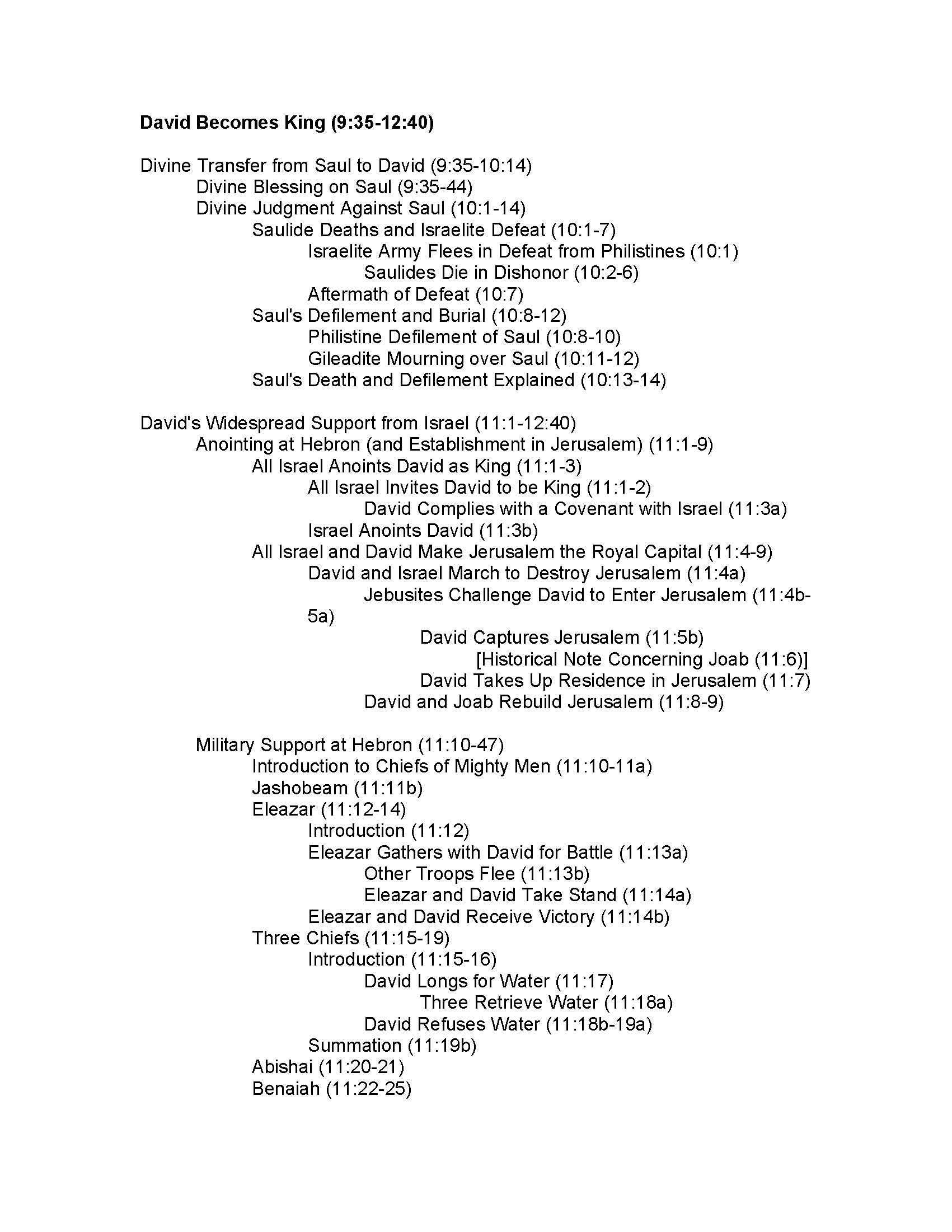
Part 2. Writing the Personal Narrative
Now that you have brainstormed some ideas needed to start with your personal narrative, it is finally time to get to your computer and ignite the thought train full speed ahead.
Start with a hook. First impressions matter! If you have successfully bored out the audience in their chairs, then congratulations, only a few people are going to pay attention to what you have to say throughout the rest of your speech. Attention-grabbers often come in the form of a story, a quote, a personal experience. You may also see valedictorian speech.
For example, you can mention in the first line of your personal narrative: “I remember this one time when I accidentally slipped and fell down on the lake when I was fishing while everyone was staring at me.”
Set the scene with action. Every good story will not be complete without providing some background information and supporting details to the characters in your story.
Move chronologically through the events. When you begin your speech with your four year-old self accidentally drowning in a swimming pool just because he saw a slide and he wanted to get on it, do not immediately proceed to when you nine years old and you accidentally punched someone in the face because he was a jerk. It is important to set things in order as to avoid confusion between the timeline of your story. Finish explaining everything that occurred in event A before proceeding to event B and finally concluding with event C. You may also see acceptance speech.
Use sensory detail and description. They say it is important to show and not just simply to tell. Most speeches would allow visual aids or props to be presented at the front to give an audience a better idea on what the speaker is describing. But if not, then you must be able to use your imagination describing the object or event you have felt using the five senses. You may also see persuasive speech.
Finish with a moral or takeaway. Wrap your personal narrative up with a reflection or analysis of the transpired events. It is important that at the end of your speech, the audience is left with something to recall even if he forgets everything else. Allow them to leave the room with the moral and lessons that they have learned from your speech. You may also see elevator speech.
Speech 101 Narrative Speech Outline Example
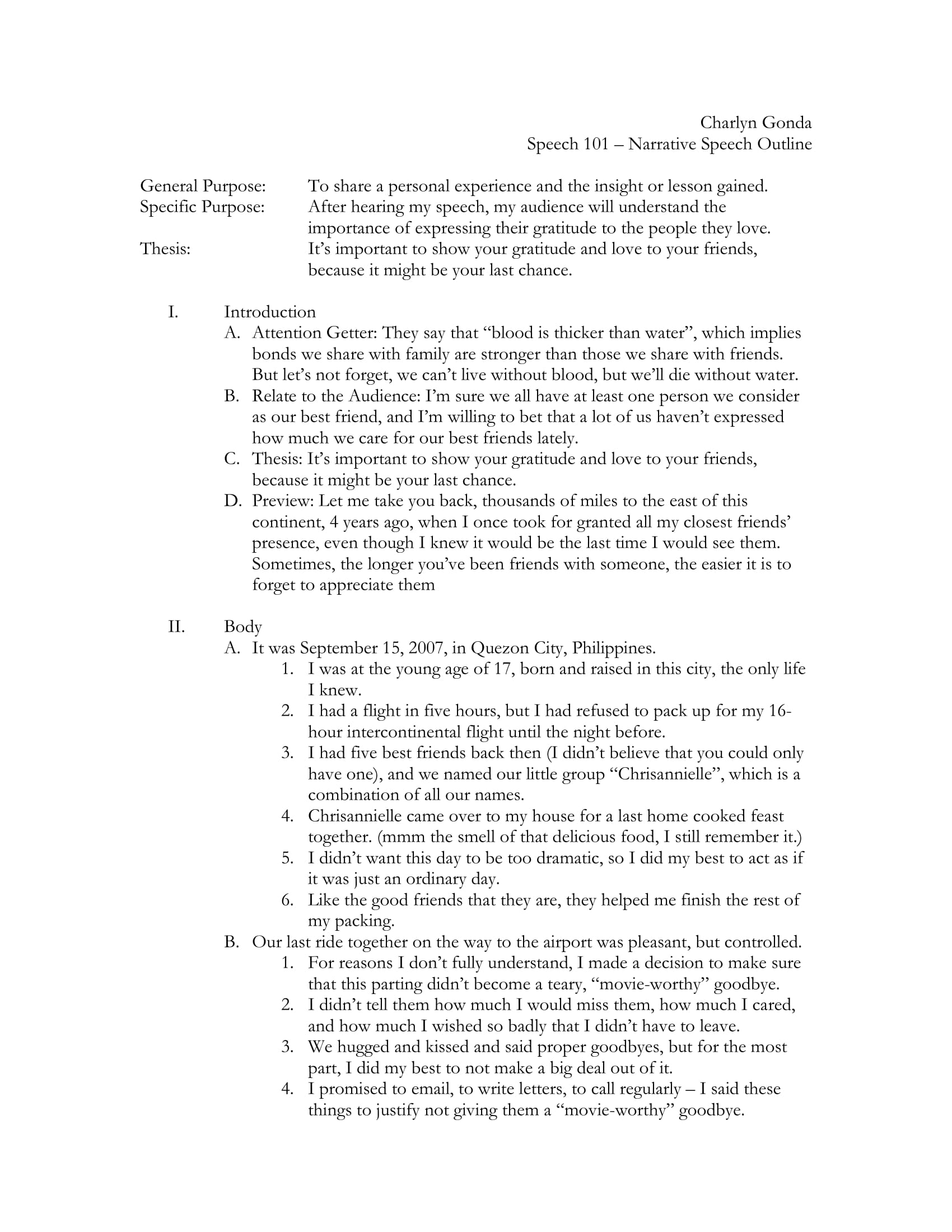
Elements of a Good Narrative Speech
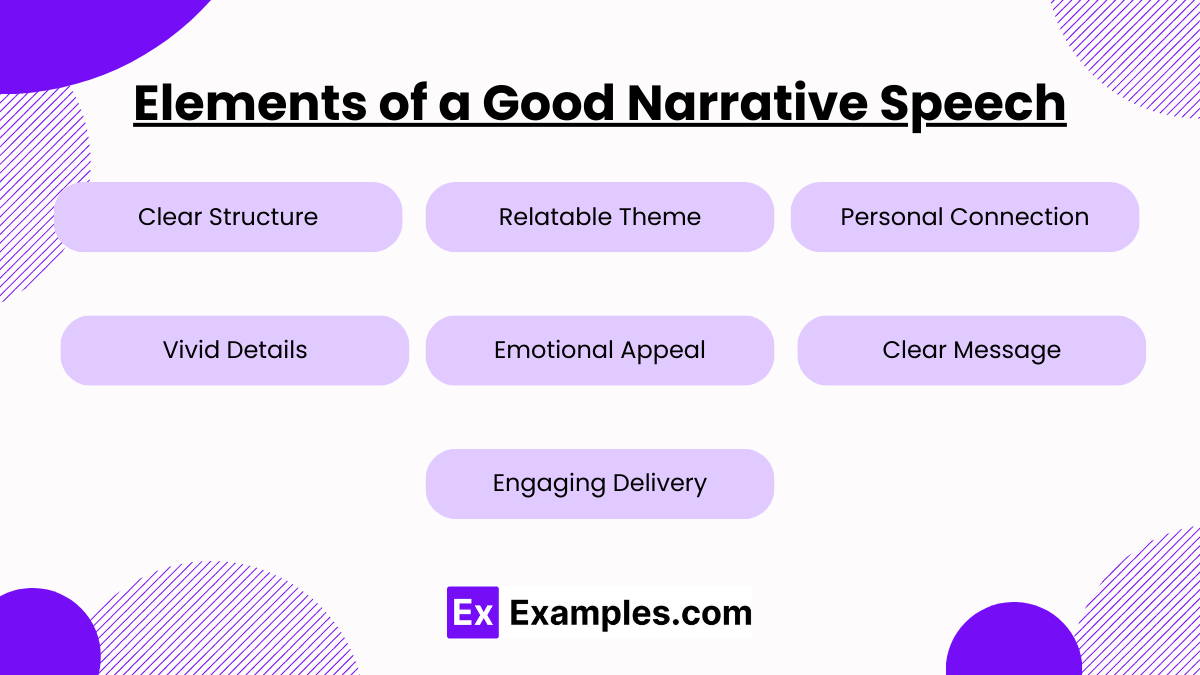
Clear Structure
A good narrative speech has a clear beginning, middle, and end. This ensures that the audience can follow the story and understand its purpose.
Relatable Theme
The story should center around a theme or message that resonates with the audience, such as overcoming challenges, personal growth, or learning an important lesson.
Personal Connection
Sharing a personal experience adds authenticity and allows the audience to connect emotionally with the speaker.
Vivid Details
Descriptive language and specific details help bring the story to life, making it more engaging and memorable for the audience.
Emotional Appeal
The speech should evoke emotions—whether it’s laughter, empathy, or inspiration—to leave a lasting impact on the audience.
Clear Message
The narrative should convey a clear takeaway or lesson that the audience can apply to their own lives.
Engaging Delivery
A strong voice, appropriate pacing, and confident body language help capture and maintain the audience’s attention.
How to Choose a Topic for Your Narrative Speech

- Reflect on Personal Experiences
Choose a meaningful story from your life that highlights a lesson or personal growth. - Focus on Relatable Themes
Pick a topic that resonates with your audience, such as overcoming challenges, achieving goals, or learning valuable lessons. - Ensure a Clear Message
Select a story that conveys a clear takeaway or moral the audience can connect with. - Keep It Simple and Focused
Avoid overly complex topics; focus on one key moment or experience to keep your speech concise and impactful. - Choose a Memorable Moment
Pick a story that includes vivid details or strong emotions to make it engaging and unforgettable for your audience.
How to Write a Narrative Speech
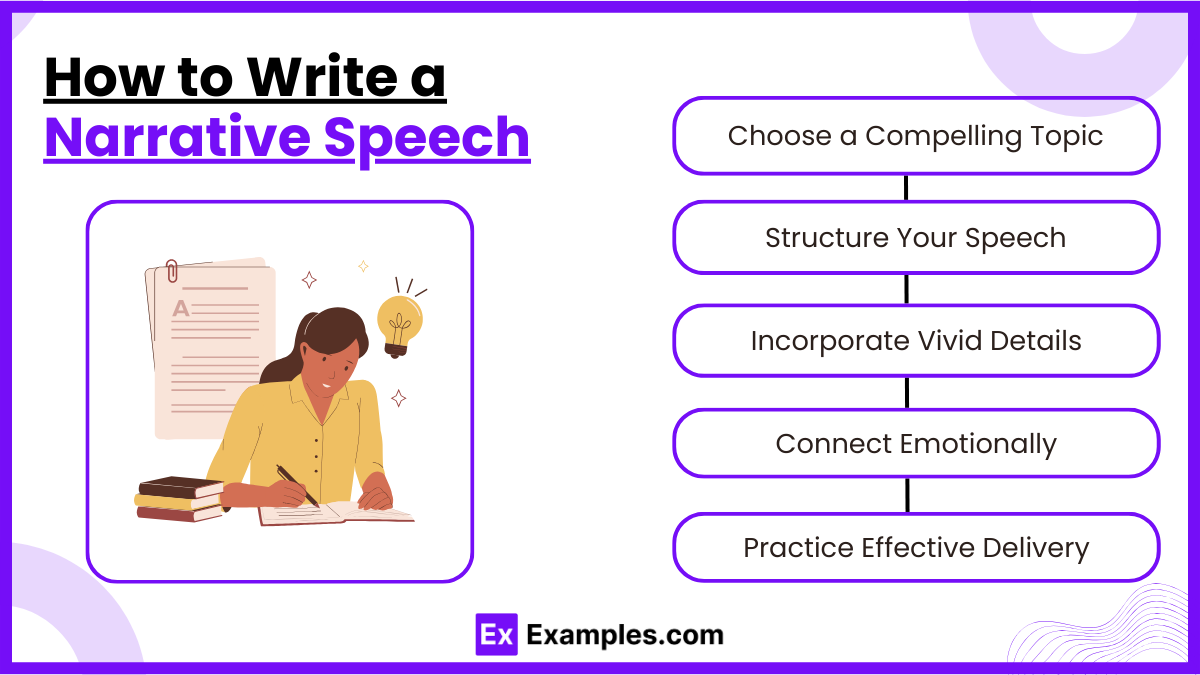
- Choose a Compelling Topic
Select a personal experience or story that aligns with your speech’s purpose and will resonate with your audience. - Structure Your Speech
Organize your speech into three parts:- Introduction: Grab attention with a hook and introduce the story.
- Body: Share the story, detailing the events in a logical order.
- Conclusion: End with the key lesson or takeaway.
- Incorporate Vivid Details
Use descriptive language, sensory details, and specific examples to bring your story to life and engage your audience. - Connect Emotionally
Share your feelings and reflections during the story to create an emotional bond with your audience. - Practice Effective Delivery
Rehearse your speech, focusing on tone, pacing, and body language to enhance the narrative’s impact.
Benefits of Giving a Narrative Speech
- Improves Communication Skills
Sharing a personal story helps enhance storytelling abilities, clarity, and emotional expression in communication. - Builds Confidence
Speaking about personal experiences boosts self-assurance and public speaking skills. - Engages and Connects with the Audience
A well-told narrative creates emotional resonance, making it easier to relate to and connect with the audience. - Encourages Self-Reflection
Crafting and delivering a narrative speech allows speakers to reflect on their experiences and gain deeper insights. - Inspires and Motivates Others
Sharing personal stories of growth, resilience, or achievement can inspire others to overcome their own challenges.
FAQs
How do I start a narrative speech?
Begin with an engaging hook, such as a question, quote, or vivid description, to immediately capture the audience’s attention.
What makes a good narrative speech?
A good narrative speech has a clear structure, relatable theme, vivid details, emotional appeal, and a strong takeaway message.
What is the purpose of a narrative speech?
The purpose is to share a personal story that entertains, educates, or inspires the audience by conveying a meaningful message or lesson.
How long should a narrative speech be?
A narrative speech typically lasts 3-5 minutes, depending on the occasion and audience, ensuring it’s concise yet impactful.
What topics are suitable for a narrative speech?
Topics include personal growth, overcoming challenges, learning valuable lessons, memorable experiences, or inspiring moments that resonate with the audience.


